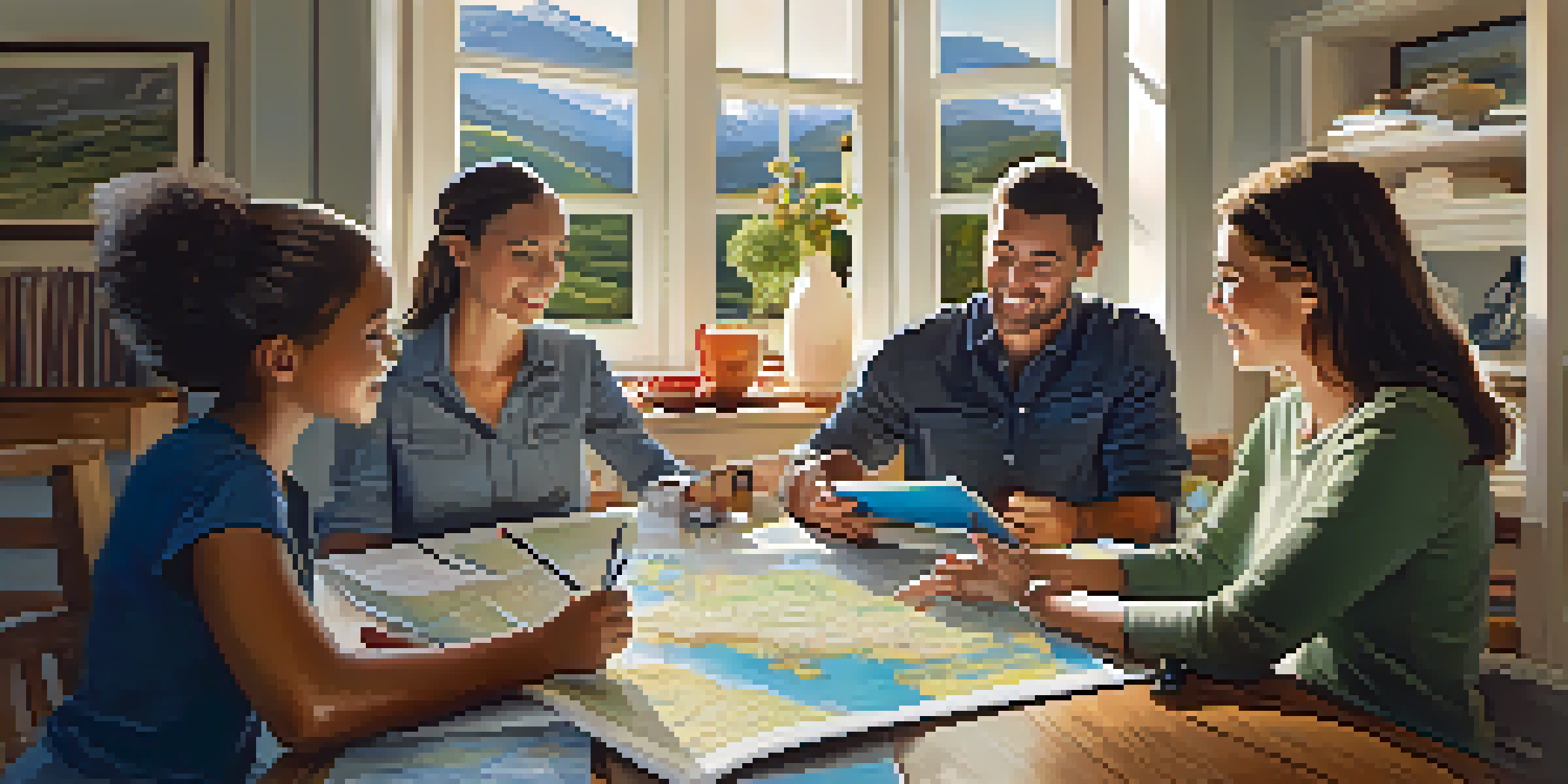How to Involve Teenagers in the Trip Planning Process

Start the Conversation Early for Better Engagement
Engaging teenagers in trip planning begins with an open dialogue. Start discussing potential trips well in advance to get their input and spark excitement. This gives them time to consider where they want to go and what activities they’d like to try, making them feel valued in the decision-making process.
The journey not the arrival matters.
When you bring them into the conversation early, it sets the stage for collaboration. Ask open-ended questions like, 'What destinations have you always wanted to visit?' This can lead to interesting discussions and may uncover hidden interests or preferences that you weren't aware of.
Moreover, talking about the trip early allows you to gauge their enthusiasm levels. If they're excited about a specific location or activity, you can build on that momentum and make the planning process feel like a joint adventure rather than a chore.
Utilize Technology for Collaborative Planning
In today’s digital world, technology can be a fantastic ally in the trip planning process. Consider using shared apps or platforms where everyone can contribute ideas, such as Google Docs or Trello. This allows teenagers to research destinations, activities, and accommodations at their own pace, making it a fun and interactive experience.

You can even set up a group chat where everyone can throw around ideas, share links, or post articles about places of interest. This not only keeps the planning process organized but also makes them feel like they have a stake in the journey, helping to foster a sense of ownership.
Engage Teens Early in Planning
Starting discussions about trips early allows teenagers to feel valued, share their interests, and be more excited about the journey.
Plus, using technology can make the planning process visually appealing. Create a shared photo board of potential destinations or activities, allowing them to express their preferences in a creative, engaging way.
Encourage Research and Independence
One effective way to involve teenagers in trip planning is to encourage them to do their own research. Assign them specific tasks like finding the best activities at a chosen destination or researching local cuisine. This not only empowers them but also helps them develop valuable skills they’ll use in the future.
The best way to predict the future is to create it.
As they dig deeper into their assigned tasks, they may stumble upon hidden gems or unique experiences that the family might not have considered. This could be anything from a local music festival to a must-visit café, enriching the overall trip experience.
Additionally, this approach allows teenagers to feel more connected to the trip. When they discover activities or places that resonate with them, they’re likely to be more excited and invested in the journey ahead.
Incorporate Their Interests into the Itinerary
Make the trip more enjoyable for everyone by incorporating your teenager's interests into the itinerary. If they love art, consider visiting local galleries or museums. If they’re into sports, perhaps catch a game or participate in a related activity. This not only keeps them engaged but also showcases that their interests matter.
By blending family favorites with their interests, you create a balanced itinerary that everyone can enjoy. This can lead to deeper family bonding as you all share experiences that cater to various passions and hobbies.
Incorporate Their Interests
Integrating teenagers' hobbies and preferences into the trip itinerary fosters engagement and family bonding.
Moreover, including their interests helps teenagers feel respected and heard. When they see that their preferences are valued, they are more likely to approach future trips with enthusiasm and a positive attitude.
Set a Budget Together for Real-World Skills
Budgeting is a crucial part of trip planning, and involving teenagers in this process teaches them valuable financial skills. By discussing the overall budget together, you can help them understand the costs associated with travel, accommodations, and activities. This is an excellent opportunity to discuss how to prioritize spending.
Encourage them to suggest budget-friendly activities or accommodations, fostering a sense of responsibility. Perhaps they find a great deal on a hotel or suggest free outdoor activities that everyone can enjoy, proving that fun doesn’t have to break the bank.
Involving them in budgeting also prepares them for future travel adventures. They’ll learn how to weigh options and make informed decisions, skills that will serve them well beyond family trips.
Plan for Flexibility and Input During the Trip
While planning is essential, leaving room for spontaneity can enhance the trip experience. Discuss with your teenagers the importance of flexibility in travel. Sometimes, the best memories come from unplanned moments, whether it's discovering a local market or stumbling upon an intriguing landmark.
Encouraging them to suggest spontaneous activities can make them feel more involved during the trip. If they spot something interesting while exploring, let them lead the way. This can lead to authentic experiences that cater to their curiosity and spirit of adventure.
Teach Budgeting Skills Together
Involving teenagers in setting a budget helps them learn valuable financial skills while making them feel responsible for the trip.
By balancing planned activities with opportunities for spontaneity, you create a dynamic travel experience. This not only keeps the trip exciting but also promotes teamwork and collaboration among family members.
Debrief After the Trip for Future Improvements
After the trip, take some time to discuss what everyone enjoyed and what could be improved for next time. This debriefing session can provide valuable insights for future travels and ensures that everyone feels heard. Ask your teenagers what they liked best, what they would change, and any new ideas they have for future trips.
This reflection not only helps in planning better trips but also reinforces the importance of their contributions. When teenagers see that their feedback leads to tangible changes, they’re more likely to engage in the planning process next time.

Lastly, sharing memories and lessons learned solidifies the family bond. It becomes a wonderful way to wrap up the adventure while looking forward to even more exciting trips in the future.